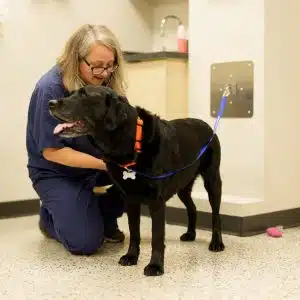Symptoms your pet needs a Veterinary Cancer Specialist evaluation
Wiki Article
The Value of Very Early Detection: Insights From a Veterinary Oncologist
Early discovery of cancer cells in animals is a necessary topic for animal owners and veterinary specialists alike. Veterinary oncologists emphasize the significance of recognizing refined indicators that might suggest major health and wellness concerns. Usual signs and symptoms often go unnoticed up until they intensify. Recognizing these early caution indicators and improvements in analysis techniques can make a considerable difference. What actions can family pet proprietors require to improve their pets' opportunities of very early medical diagnosis and better treatment outcomes?Recognizing Cancer in Pets: Typical Kinds and Signs And Symptoms
While several pet dog proprietors might not recognize it, cancer is a significant wellness concern impacting pets, similar to it carries out in people. Common sorts of cancer cells in family pets consist of lymphoma, mast cell growths, osteosarcoma, and mammary tumors. These malignancies can show up in various ways, depending on their location and kind. Signs typically include unexplained fat burning, consistent vomiting, adjustments in hunger, or uncommon swellings and bumps. Pet dogs may additionally show sleepiness, problem breathing, or hesitation to exercise, which can suggest underlying wellness problems. Early signs can be refined, making it necessary for pet dog proprietors to be watchful of their animals' behaviors and physical condition. Comprehending these typical kinds and connected symptoms can empower proprietors to seek vet treatment immediately, possibly leading to earlier medical diagnosis and treatment alternatives. Recognizing the indicators of cancer in animals is an important action towards improving their health and wellness and lifestyle.The Duty of Vet Oncologists in Early Discovery
Vet oncologists play an essential duty in the early discovery of cancer in animals, as their specialized training furnishes them with the skills essential to determine refined signs that might be forgotten by general experts. They make use of a mix of medical knowledge and advanced diagnostic tools to assess clients extensively - Pet Cancer Surgery. By identifying early signs and threat aspects, oncologists can direct pet dog proprietors towards prompt interventions, increasing the chances of effective treatmentFurthermore, vet oncologists usually collaborate with basic experts to develop screening protocols tailored to details types or age groups, boosting the efficiency of early detection initiatives. They educate family pet proprietors on the relevance of routine exams and understanding of adjustments in behavior or physical condition. Through these aggressive measures, veterinary oncologists significantly contribute to enhancing results for pets diagnosed with cancer cells, highlighting the crucial nature of their duty in vet healthcare.
Advancements in Diagnostic Techniques for Family Pet Cancer Cells
Improvements in analysis strategies have actually substantially improved the ability to detect cancer in family pets at earlier stages. Strategies such as innovative imaging, consisting of MRI and CT scans, supply comprehensive internal views, allowing veterinarians to identify growths that might not be palpable. Furthermore, the development of minimally intrusive treatments, such as fine needle aspirates and biopsies, makes it possible for accurate tasting of tissues for histopathological examination with minimized anxiety for the animal.Arising molecular diagnostics, including genetic testing and biomarker recognition, are transforming the landscape of vet oncology. These methods can identify certain cancer types and predict actions to therapy, assisting in individualized care strategies. Advancements in lab techniques, such as fluid biopsies, are starting to supply non-invasive options for keeping track of lump development and treatment effectiveness. Jointly, these developments represent a considerable leap ahead in vet medication, highlighting the important function of early discovery in boosting results for animals diagnosed with cancer.
How Family Pet Owners Can Recognize Indication
Just how can family pet proprietors become cautious in identifying possible indication of cancer cells? Understanding of physical and behavioral changes in family pets is important. Common indications include unusual sleepiness, anorexia nervosa, or unexpected weight changes. Family pet owners should additionally take notice of relentless throwing up or looseness of the bowels, which may indicate underlying problems.Adjustments in the skin, such as lumps, bumps, or sores that do not recover, necessitate immediate veterinary interest. Furthermore, owners should note changes in drinking routines, raised urination, or difficulty in breathing. Unexplained hopping or discomfort may additionally be indications of more serious conditions.
Regular vet check-ups can assist determine these warning indicators early. By maintaining a close monitoring of their pets' wellness and habits, proprietors can play a key function in early discovery, possibly causing much better results need to cancer cells be diagnosed. Recognizing these indicators may considerably influence a pet dog's quality of life.
The Influence of Early Discovery on Treatment Results
Early discovery of cancer in family pets plays an important duty in figuring Board Certified Veterinary Oncologist out treatment outcomes, as it usually enables for a bigger variety of therapeutic alternatives. When cancer cells is diagnosed in its very early phases, veterinarians can carry out much less invasive treatments, increasing the likelihood of effective intervention. Early-stage cancers cells may additionally respond better to chemotherapy or radiation, leading to improved survival rates and general lifestyle for the family pet.Additionally, punctual medical diagnosis facilitates a more customized therapy strategy, aligning with the details demands of the pet. This can include individualized medication programs or medical treatments that are much less hostile. Conversely, late-stage detection usually causes restricted alternatives, much more aggressive treatments, and poorer prognoses. Subsequently, the importance of very early detection can not be overstated; it basically alters the trajectory of treatment, making it crucial for pet dog owners to remain alert for any indicators of health problem in their cherished companions.
Often Asked Inquiries

Exactly How Can Diet Influence Cancer Cells Risk in Pet Dogs?
Diet substantially influences cancer risk in pet dogs, as particular nutrients and food types can either inhibit or advertise lump development. A well balanced, nutrient-rich diet regimen may help in reducing the chance of establishing cancer cells in animals.
Are Certain Types A Lot More Prone to Cancer cells?
Certain dog breeds, such as Golden Retrievers and Boxers, show greater cancer cells sensitivity because of genetic tendencies. Some feline breeds additionally show raised cancer risks, highlighting the importance of breed-specific health and wellness awareness among family pet owners.
What Are the Expenses Related To Very Early Cancer Detection?
The costs related to early cancer cells detection can differ significantly, incorporating diagnostic examinations, consultations, and possible treatments - Veterinary Oncologist. Investing in these services frequently results in far better wellness results, inevitably minimizing much more extensive future clinical expendituresCan Vaccines Stop Cancer in Animals?


Vaccines might decrease the risk of particular cancers cells in family pets, specifically those linked to viral infections. Nevertheless, their efficiency varies, and pet owners ought to get in touch with veterinarians for customized recommendations relating to inoculation and cancer avoidance strategies.
Exactly How Usually Should Pet Dogs Be Screened for Cancer cells?
Pets should usually be screened for cancer cells yearly, especially as they age or if they show threat aspects. Routine vet check-ups can help determine possible concerns early, enhancing treatment results and general wellness management.Early detection of cancer cells in pet dogs is a vital subject for pet owners and vet experts alike. Early indications can be refined, making it necessary for pet owners to be watchful of their pets' behaviors and physical condition. Vet oncologists play a vital duty in the early detection of cancer in animals, as their specialized training furnishes them with the skills required to recognize refined indicators that might be overlooked by basic specialists. By preserving a close monitoring of their animals' wellness and actions, owners can play a crucial role in early detection, potentially leading to far better end results need to cancer be detected. Early discovery of cancer in animals plays a vital function in identifying treatment results, as it usually enables for a broader array of restorative options.
Report this wiki page